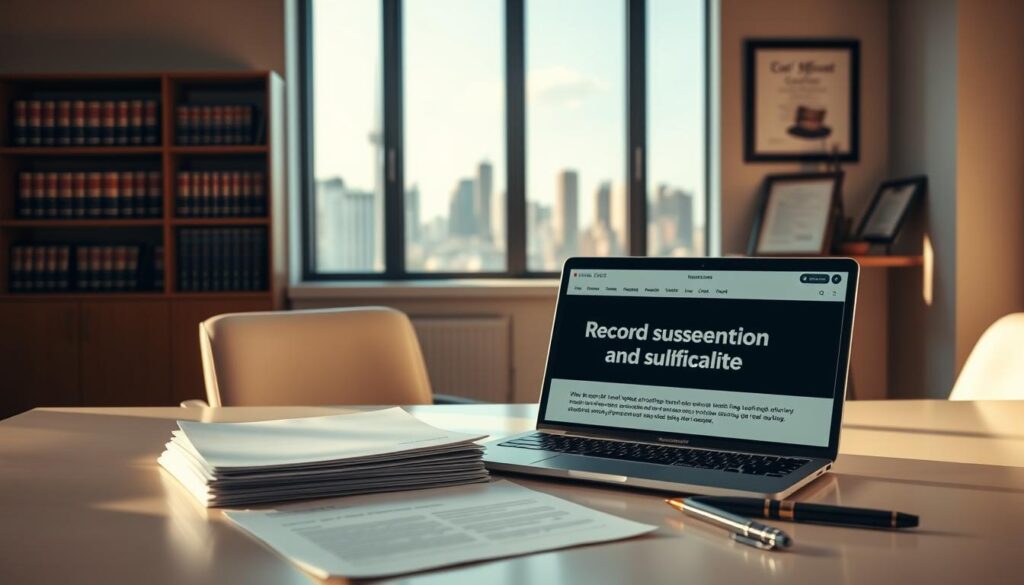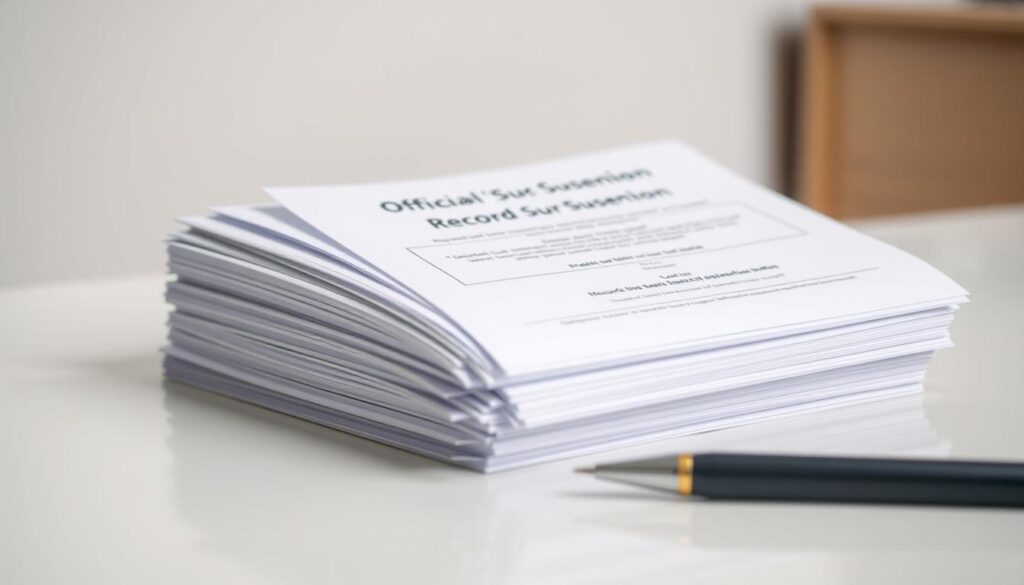Did you know over 400,000 Canadians live with a criminal record? Since March 2012, the term “pardon” officially became record suspension under Bill C-10. This change didn’t alter the outcome – your past remains sealed and separate from active databases.
A successful record suspension ensures background checks show no trace of prior convictions. Whether seeking employment, volunteering, or traveling abroad, this legal step removes barriers that might hold you back.
The process typically takes 6-12 months and involves multiple agencies like the RCMP and Parole Board of Canada. Eligibility depends on completed sentences and waiting periods ranging from 5-10 years, depending on the offense.
Clearing your record isn’t just paperwork. It rebuilds confidence and opens doors once closed. With proper guidance, navigating this system becomes manageable, even empowering.
Understanding Record Suspensions and Pardons in Canada
Since 2012, the terminology around clearing criminal records has shifted significantly. What was once called a “pardon” is now officially a record suspension under Canadian law. This change came through Bill C-10, part of broader crime legislation reforms. Despite the new name, the process maintains its core purpose: separating past convictions from public access.
Defining Pardons and Record Suspensions
The Parole Board of Canada oversees all record suspension applications. Whether you call it a pardon or suspension, successful approval seals your criminal record. This means police services and background checks won’t show prior convictions once processed.

Any interaction with law enforcement – even without convictions – creates a permanent criminal record. Charges that were withdrawn or dismissed still appear in police service databases. A record suspension removes this information from public view.
Recent Legislative Changes and Their Impact
Bill C-10 introduced stricter eligibility rules and extended waiting periods. For example, those convicted of sexual offenses against minors became permanently ineligible. The legislation also increased application scrutiny, requiring detailed employment history and personal circumstances documentation.
Despite these changes, the fundamental benefit remains unchanged. Legal professionals still use both terms interchangeably, emphasizing that the outcome – a fresh start – hasn’t changed since 2012.
How to Obtain a Pardon in Canada: Eligibility and Application Process
Clearing your criminal record requires navigating two critical phases: meeting strict eligibility criteria and executing a precise application strategy. The process demands careful planning, as even minor missteps can derail your efforts.
Eligibility Requirements and Good Conduct Considerations
Your eligibility clock starts only after completing all court-ordered sentences, including probation and fines. Waiting periods differ based on offense severity:
- 5 years for summary convictions
- 10 years for indictable offenses
The Parole Board Canada scrutinizes every interaction with law enforcement during this period. A dismissed charge or police questioning could reset your timeline. One applicant learned this harsh truth when a withdrawn shoplifting allegation voided their 7-year clean record.

Step-by-Step Overview of the Application Process
Begin by requesting your criminal record from the RCMP. Next, collect court documents proving sentence completion. The Parole Board Canada requires:
- Detailed personal conduct statements
- Local police records checks
- Proof of community contributions
Applications involving sexual crimes undergo extra scrutiny. Processing takes 6-12 months, with incomplete forms being the top rejection reason. Many find success through certified pardon services, though self-filing remains possible with meticulous attention to detail.
Gathering Required Documents and Fingerprinting Procedures
Document collection forms the backbone of your record suspension application. Missing or incomplete paperwork causes 38% of rejections, according to Parole Board Canada statistics. Precision matters at every step.

Obtaining Criminal Record Documents from the RCMP
Start with electronic fingerprinting through an accredited service or police service. Your submission must specify “record suspension application” to trigger proper RCMP processing. Expect 4-6 weeks for your complete criminal record to arrive.
Review every conviction listed. Missing entries require Proof of Conviction documents from original courts. These must show:
- Exact offence and sentence details
- Arresting police force
- Court location and sentencing date
Arranging for Fingerprinting and Local Police Records Checks
Local police stations handle records checks for areas where you’ve resided in the past five years. Fees range from $25-$130 per location. Rural police services often process requests faster than urban counterparts.
Delays occur when courthouses take weeks to retrieve old files. One applicant waited three months for a 1998 theft conviction record from Toronto’s Old City Hall. Persistent follow-ups help accelerate responses.
Navigating Application Costs, Fees, and Processing Times
Budgeting accurately requires understanding every expense involved in the record suspension process. Total costs typically reach $1,100, including professional preparation fees and mandatory government charges. Hidden expenses like courthouse document retrieval or multiple police checks can add unexpected pressure if not planned for.

Understanding the Breakdown of Costs and Fees
Preparation services charge around $930+tax to assemble your suspension application. Essential government fees include:
- RCMP fingerprinting: $85 (includes $25 service fee)
- Court documents: $0-$20 per request
- Local police checks: $25-$130 per jurisdiction
The Parole Board of Canada’s final submission fee sits at $44.88. Frequent movers face higher costs – five addresses in five years could mean $650 just for police records.
Processing Times and Factors Affecting Delays
Most applications clear within 6-12 months, but complex cases take up to two years. Indictable offences demand longer reviews than summary convictions. Slow document responses from rural courthouses or busy urban police services often create bottlenecks.
One Toronto applicant waited 14 weeks for a single court transcript. Proactive follow-ups with records departments help maintain momentum. Remember: Your timeline starts only after submitting complete paperwork to the Parole Board.
Completing the Application: Forms and Submission Process
Finalizing your record suspension application demands precision. Three core documents form the foundation: the Record Suspension Application Form, Schedule 1 Exception Form, and Measurable Benefit/Sustained Rehabilitation Form. Each serves distinct purposes within Canada’s justice framework.

Essential Forms Explained
The Record Suspension Application Form requires exact personal details and offence history. Errors here account for 63% of returned applications, according to Parole Board Canada data. Military personnel must attach their Conduct Sheet – this replaces local police checks for service-related offences.
| Document | Purpose | Special Notes |
|---|---|---|
| Schedule 1 Exception Form | Required for sexual offences against minors | Notarization mandatory |
| Measurable Benefit Form | Demonstrates rehabilitation impact | Include employer references |
| Citizenship Proof | Verifies eligibility status | Certified copies only |
Documentation Best Practices
Photocopy identification documents using black-and-white settings for clarity. Local police services require original ink signatures on records checks – digital copies get rejected. Double-check court document dates against your criminal record.
Final Submission Protocol
Mail your package to the Parole Board Canada via tracked post. Include the $50 fee as a money order payable to “Receiver General for Canada”. Applications missing the checklist face automatic returns – one Ottawa resident learned this after three submission attempts.
Keep photocopies of every page. The review clock starts only when all materials arrive intact. Proper preparation transforms complex paperwork into achievable steps toward a fresh start.
Alternative Options and Professional Assistance
Deciding between self-filing and expert help impacts your record suspension success. Both paths require understanding complex legal requirements, but the level of support differs dramatically.
DIY Approach vs Hiring a Pardon Service Agency
Handling the process yourself saves money but demands precision. You’ll need to collect police records, court documents, and complete forms without errors. Missing deadlines or incomplete criminal record details often lead to rejections.
Professional agencies streamline submissions through certified processes. Their expertise reduces delays caused by common mistakes. Many services offer document retrieval and direct communication with the Parole Board.
Benefits of Consulting a Lawyer or Pardon Specialist
Legal professionals navigate nuanced cases involving indictable offenses or multiple jurisdictions. They interpret recent legislative changes that might affect your record suspension eligibility.
Specialists also advocate for measurable benefits during reviews. This includes highlighting rehabilitation efforts employers or border officials might value. Their guidance often turns complex paperwork into a structured, manageable journey.
Your choice shapes how quickly barriers lift. While self-filing works for straightforward cases, professional service support increases approval odds for complex histories. Either way, sealing your past opens new chapters.

